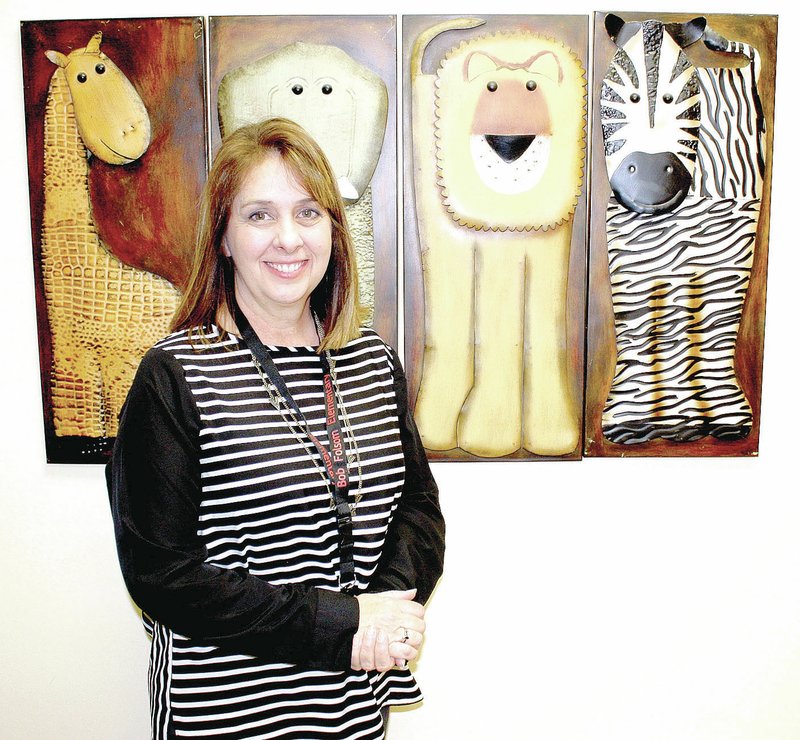FARMINGTON -- Karla Long, counselor at Folsom Elementary in Farmington, creates memory books with students who have lost a parent to preserve family history.
If the surviving parent, or even the deceased parent prior to death, has helped children collect memories this is very beneficial.
"One of the things that I do is a memory book," Long said. "One of the things that bothers them is that they can't remember things about that parent. They passed away when they were real young."
Long is one of many area teachers who has received an honor this year from Fayetteville Chamber of Commerce, called the "Above & Beyond Award." Sam's Furniture sponsors the award and is handing them out to teachers in Washington County school districts each month.
Long was recognized for her work addressing grief issues with students.
Shannon Cantrell, Folsom principal, said Long goes above and beyond every day with students and staff. Long meets with every class twice monthly teaching them what it means to have good character and how to put positive character traits in action. She meets with students during their lunch and other times of the day.
"These groups are strategically planned based on their needs," Cantrell said during a December school board meeting. "For example, she is currently meeting with a small group of third-graders who have all lost a parent tragically. She was sharing with me just yesterday the deep conversations these students are having with each other about their loss. She is truly making a difference in their lives."
Long uses the resource of a grief packet compiled by Arkansas Children's Hospital, which she distributes to children who have lost a parent.
Along with helping children create a memory book, she said she also wants to make sure a child doesn't absorb blame for the death of a parent.
"Make sure the child knows that the death (of their parent) was in no way their fault," Long said. "At an elementary age children have a way of connecting that to themselves and thinking that they were responsible. So, it's very important to make sure they know that they weren't responsible for that."
Long cited an example of a parent enduring a battle with cancer, and the struggle of a young child endeavoring to sort through mixed messages in the aftermath of the parent's death.
"With little kids a lot of people will tell them the dead person isn't suffering anymore and they wonder why everybody around them is sad," Long said. "There was a little boy who kept saying, 'Why is everybody sad? She's not suffering anymore.'"
She noted, "Little kids enjoy the attention that they get. It's not unusual for them to think this is a party because of all the attention that they get, all the food that is brought to them and all the attention."
Long emphasizes that caregivers tell children all their feelings are OK.
"It's OK to be sad, but you don't have to be sad. You can enjoy the food. Littles understand a little of it at a time."
Long perceives this lack of comprehension among young children as a gift because they aren't forced to confront the reality of the future immediately.
"When I know that a parent has religious beliefs I tell parents often, 'Just look at that as God's gift,'" Long said. "Work through it with them as they grow. Teach them a lot about death a little at a time."
Teenagers who lose a parent need as much support as younger children, Long said.
"Realize this isn't going to be a one week or a one month process," Long said. "He's going to need some people that are there for the long run."
Long believes in most cases school counselors want to be there and available to be supportive, but at the same time, they don't want to be intrusive. It's important for parents to realize that school counselors are a good source of help and not to be afraid to ask school counselors for help," she added.
It's easier at all ages to be mad when death occurs than to process the situation and Long said she's found "little kids tend to blame themselves while older kids look for someone else to blame."
If children or teenagers don't deal with blaming themselves or blaming someone else, those perceptions can hinder them throughout their lives. Long said there is value in exploring those issues.
"Don't blame yourself, don't blame someone else, let them work through it and ask (themselves) 'What can I do now?'"
General News on 02/28/2018
